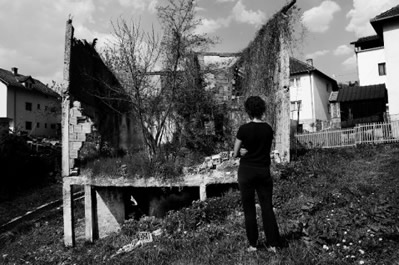An Australian in Višegrad
by Hikmet Karčić
Kym broke into tears as she walked into Adem Omeragic’s garden in Pionirska Street. Kym Vercoe is an Australian actress and author of the performance work ‘Seven kilometers North-east’ – a solo reflection on war crimes, denial and the quest for truth. The play premiered in Sarajevo in April this year.
Adem Omeragic’s house in Visegrad (Bosnia and Herzegovina) was the scene of the Pionirska Street massacre where around 70 Bosniak civilians – elderly men, women and children – were burned alive on 14 June 1992 by Bosnian Serb soldiers and policemen. To date, only one of the individuals responsible, Milan Lukic has been successfully prosecuted for this crime.The remains of the house still stand there. The house and the garden have been turned into a waste dump by the local authorities. The brickwork of the house has been removed piece by piece by the local population.
‘I searched for Pionirska Street last year when I visited Visegrad but I couldn’t find it’ she told me as we walked pass the primary school ‘Vuk Karadzic’. The school was a torture camp during the first months of the war in 1992. A Bosnian war crimes investigator explained ‘The sports gym was filled with blood. Men were interrogated and beaten in front of their children and wives. One of my friends, Admir, was grabbed by the jacket by a Serb soldier and his mother was told to either collect money or her son would be murdered.’ Today there is no sign that any of this ever occurred, either at Pionirska Street or at the primary school. There is not a single memorial to the Bosniak victims anywhere in Visegrad. The absence of monuments and the silence of Bosnian and foreign journalists, scholars and historians about the war crimes committed in Visegrad ended up making Kym pay a heavy price.
In the summer of 2008 she arrived in Visegrad on the recommendation of a Serb friend from Belgrade. It was a busy week with a lot of tourists in town and all the hotels were full, so it was suggested that she try a spa hotel just outside Visegrad. No-one told her that there was anything exceptional about Vilina Vlas.. It was not until she arrived back in Australia that she discovered the truth about Vilina Vlas online and found out how during the Bosnian war the hotel had been notorious as a ‘rape camp’ where around 200 Bosniak women were detained, raped and murdered under the same roof where she had spent her stay.
There was dead silence as Kym entered the basement of Adem Omeragic’s house where the Bosniak civilians had been crammed in. Grenades and petrol-bombs had been thrown through the two windows. Serb soldiers and policemen stood outside and shot people as they tried to escape through the windows, but several badly wounded victims managed to survive. Kym stood in the middle of the basement, crying between its shrapnel-pockedwalls.
The perpetrators, and their superiors, were not satisfied by the results of this operation and so 15 days later they tried again. On 27 June 1992, around 70 Bosniak civilians – again, women, children and the elderly – were barricaded into a house on Bikavac Hill. The windows and doors were locked. Once again grenades and petrol-bombs were tossed into the house and anyone who tried to escape was shot. This time only one woman – Zehra Turjacanin – managed to survive. She was severely burned and had to undergo several operations. Today she lives in France. She has never returned to Bosnia.
Last year the Visegrad municipal council decided to expropriate some land in Pionirska Street in order to build a new road. The plans showed that the new road was intended to pass across Adem Omeragic’s property. It was clear that this was a final attempt to finish what was started all those years ago. Victims’ organizations have stepped up efforts to stop this expropriation.
Kym decided to use her own experience to warn other foreigners how misleading guidebooks can be. She was the first artist to write a play about Visegrad. Despite all the talented artists and actors in Bosnia, it took an actress from down under to come to Sarajevo and tell us that Visegrad does not deserve to be forgotten. It is time there was a memorial to what happened in Visegrad. In the meanwhile ‘Seven kilometers North-East’ will hopefully serve as a reminder and open the eyes that most Bosnians prefer to keep shut.
Home
|

"Adem Omeragic’s house in Visegrad (Bosnia and Herzegovina) was the scene of the Pionirska Street massacre where around 70 Bosniak civilians – elderly men, women and children – were burned alive on 14 June 1992 by Bosnian Serb soldiers and policemen."
-from An Australian in Višegrad by Hikmet Karčić
|
